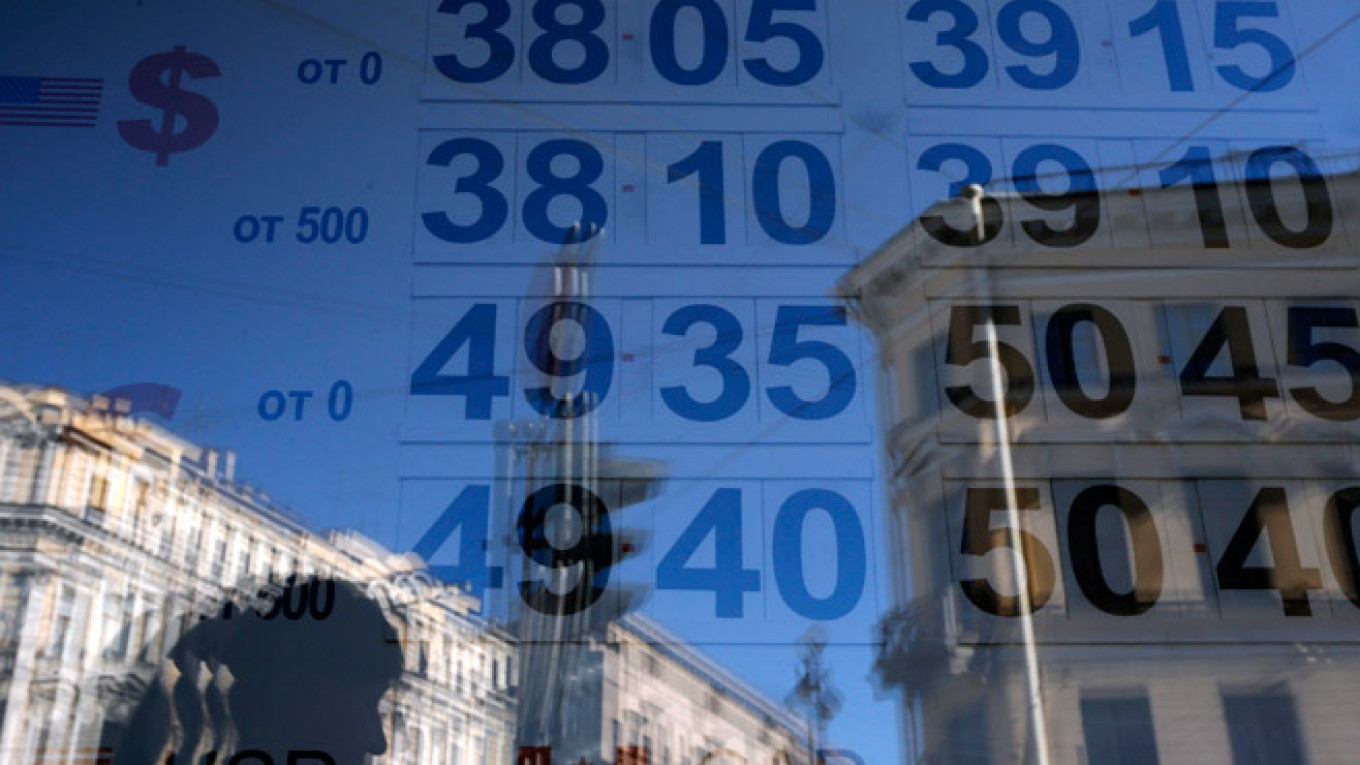Russia's beaten-down stocks may have tempted U.S. fund giant Franklin Templeton but few other investors are following, as the country's economic meltdown fuels a nosedive in its currency that could render any investment worthless.
Templeton stepped forward in September, arguing a recent sharp sell-off had gone too far and that the benefits of cheap Russian equity could not be overlooked against world stock markets at historically expensive levels.
But since then, the Russian stock market has fallen further, investors taking fright at the country's evaporating growth and rising inflation — the result of Western sanctions over the crisis in Eastern Ukraine, which collided with a slowing economy — alongside a falling oil price.
Not only has Russia's dollar-denominated stock index plunged more than 20 percent since mid-July, but the ruble has fallen 17 percent against the dollar to record lows.
"It is very difficult to make money in these markets in hard currency terms," said Maarten-Jan Bakkum, emerging markets equity strategist at ING Investment Management, who has minimal exposure to Russia and intends to maintain that position.
"The weakening ruble also creates problems for domestic demand: You might have inflationary problems, and interest rates might have to be hiked, and it doesn't really help your growth outlook."
The Russian economy is only expected to grow 0.5 percent at best this year and the government's budget relies on an income from oil prices far higher than where they are now. This is also likely to affect the central bank's ability to defend the ruble.
"If you don't think oil prices will rebound, the only thing Russia can do is devalue the ruble. It's different from 2008-2009 when they thought that this was a short-term aberration and the recovery in the global economy would quickly come through," said Yerlan Syzdykov, head of emerging debt at Pioneer Investments.
More Pain Ahead
As a result of western sanctions, global markets are virtually closed to Russian companies looking to refinance dollar debt. Consequently many are resorting to selling the ruble on local markets to buy hard currency — putting further pressure on it — and many may eventually need cash from the central bank.
"The central bank is hoarding dollars knowing that if someone is not able to refinance external debt it may have to step in and provide dollars, so they really need to start saving," said Syzdykov, who has held an 'overweight' investment rating on Russia for five years but is now gradually cutting his exposure.
"From that perspective I don't see any reason why investors should bet on the ruble."
While all emerging market currencies have been hit by gains in the dollar — caused by bets on a U.S. rate rise next year — the ruble has been among the worst hit.
Derivatives markets indicate no respite ahead: Investors are increasingly buying so-called dollar/ruble risk reversal options that demonstrate a growing bias for dollar strength and ruble weakness in coming months.
And the ruble's implied volatility is also rising. Charts show the future likelihood of sharp currency swings rising in the near-term.
"I do see a longer term trend of depreciation," said TD Securities' strategist Cristian Maggio.
An Un-Investible Market?
EPFR fund allocation data showed emerging equity funds cut their average exposure to Russian shares to 4.65 percent by early September compared with 5.91 pct in July.
Global funds reduced their exposure to 0.66 percent in September from 0.74 percent in July — almost in line with Russia's 0.5 percent weighting in MSCI's All Country World Index.
However there's little doubt that for brave investors Russian assets look cheap: The valuation gap between Russian and emerging equities, based on forward earnings and book value, is the widest on record.
Fund flows throughout the year have seesawed in a way that suggests some investors have taken short-term risks.
One of the few investment houses to agree with Templeton Franklin is JPMorgan Asset Management, which is adding to its Russian holdings and has noted that dividend yields — how much a company pays in dividends relative to its share price ‑— on Russian equities have overtaken price to forward earnings ratio for the first time since 2008.
Whenever this has happened in an emerging market, it has been followed by an average 74 percent return over the coming year, unless one expects an Argentine-style default, JPMAM says.
But headline numbers don't count for much when currency volatility can wipe out returns in a matter of hours, warns Jorge Mariscal, emerging markets CIO at UBS Wealth Management.
"If you are willing to trade for two weeks and have the stomach and ability to do so, then Russia is for you," said Mariscal. "But we have begun to think of Russia as an un-investable market."
A Message from The Moscow Times:
Dear readers,
We are facing unprecedented challenges. Russia's Prosecutor General's Office has designated The Moscow Times as an "undesirable" organization, criminalizing our work and putting our staff at risk of prosecution. This follows our earlier unjust labeling as a "foreign agent."
These actions are direct attempts to silence independent journalism in Russia. The authorities claim our work "discredits the decisions of the Russian leadership." We see things differently: we strive to provide accurate, unbiased reporting on Russia.
We, the journalists of The Moscow Times, refuse to be silenced. But to continue our work, we need your help.
Your support, no matter how small, makes a world of difference. If you can, please support us monthly starting from just $2. It's quick to set up, and every contribution makes a significant impact.
By supporting The Moscow Times, you're defending open, independent journalism in the face of repression. Thank you for standing with us.
Remind me later.


